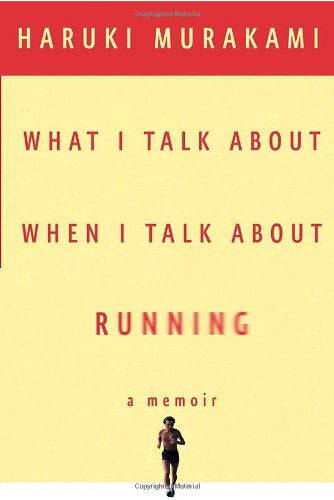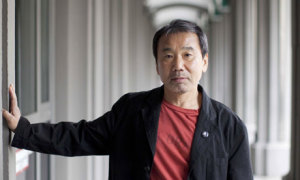 I finished, yesterday, Haruki Murakami‘s What I Talk About When I Talk About Running. Murakami is the astonishing Japanese author (of Kafka on the Shore and many other titles). This book is a memoir of sorts, a reflection on running and writing, and the relationship between them. (He runs to keep fit for writing.) Of course it was the writing parts I found the most interesting, although I enjoyed learning about running as well.
I finished, yesterday, Haruki Murakami‘s What I Talk About When I Talk About Running. Murakami is the astonishing Japanese author (of Kafka on the Shore and many other titles). This book is a memoir of sorts, a reflection on running and writing, and the relationship between them. (He runs to keep fit for writing.) Of course it was the writing parts I found the most interesting, although I enjoyed learning about running as well.
Here are some lines that I found noteworthy:
“Writers who are blessed with inborn talent can freely write novels no matter what they do—or don’t do. Like water from a natural spring, the sentences just well up, and with little or no effort these writers can complete a work. … Unfortunately, that category wouldn’t include me. … I have to pound the rock with a chisel and dig out a deep hole before I can locate the source of creativity. To write a novel I have to drive myself hard physically and use a lot of time and effort. Every time I begin a new novel, I have to dredge out another new, deep hole.” [page 43]
That’s what I’m doing now: dredging.
“Writing novels, to me, is basically a kind of manual labor. Writing itself is mental labor, but finishing an entire book is closer to manual labor. … The whole process—sitting at your desk, focusing your mind like a Lazar beam, imagining something out of a blank horizon, creating a story, selecting the right words, one by one, keeping the whole flow of the story on track—requires far more energy, over a period of time, that most people ever imagine.” [page 79]
This is one reason it gets harder to write a novel as one ages. It’s simply hard work!
“You might not move your body around, but there’s grueling, dynamic labor going on inside you. Everybody uses their mind when they think. But a writer puts on an outfit called narrative and thinks with his entire being; and for the novelist that process requires putting into play all your physical reserve, often to the point of overexertion.” [page 80]
The last four months of working on Mistress of the Sun I watched my diet, avoided staying out late, and abstained from all alcohol. I felt like an athlete in training. I suspect that the depression that follows the high of finishing has to do with an extreme fatigue.
Sometimes Murakami refers to writing as a toxin.
“Basically I agree with the view that writing novels is an unhealthy type of work. When we set off to write a novel, when we use writing to create a story, like it or not a like of toxin that lies deep down in all humanity rises to the surface. All writers have to come face-to-face with this toxin and, aware of the danger involved, discover a way to deal with it, because otherwise no creative activity in the real sense can take place. (Please excuse the strange analogy: with a fugu fish, the tastiest part is the portion near the poison—this might be something similar to what I’m getting at.) No matter how you spin it, this isn’t a healthy activity.” [page 96]
I first read this passage with resistance, but I think there is truth in it. Inevitably, writing a novel entails digging deep, and often into septic layers. I think a writer must be prepared for this, and have a plan in place for self-protection.



I know, Stephanie. Sometimes I feel absolutely drained and even mute!
These quotes are wonderful, Sandra! I am so glad you shared them with your own experiences. I feel physically very tired after writing and mentally a blob. After one day of working very hard I went to an Italian class and couldn’t put together more than a few weak words. I am glad to hear I am not the only one so affected! I do much better if I stop every few hours for 5-10 minutes of yoga but I still have to be careful how much other stuff I do when writing… particularly stuff where I am expected to be somewhere and produce something like work or learning, mental stuff. Thanks so much!
Stephanie